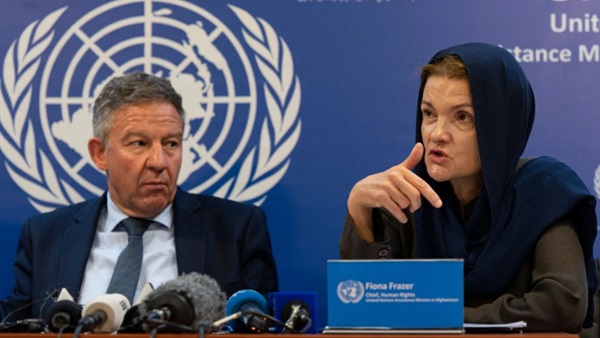U.N. Calls Ambassadors for Meeting With Taliban in Kandahar

As the people of Afghanistan prepare for winter by drugging their children to stop them crying from hunger, the United Nations has invited ambassadors for a meet and greet with leaders of the Taliban, the group that has brought back public floggings, executions, and a ban on girls’ schooling.
The U.N. Assistance Mission in Afghanistan (UNAMA) will fly ambassadors resident in Kabul to the seat of the Taliban leadership in Kandahar, Afghanistan, on Dec. 5 to hold a direct exchange of views on the situation in Afghanistan. It’s the closest thing yet to international diplomatic recognition for the Taliban, whose top leaders all have bounties for terrorism charges.
It’s a rare meeting for the Kabul-based diplomatic corps, with a figure who has laid low for years. It’s also a chance for the United Nations to press the Taliban leadership to make progress on urgent issues like feeding their people, fixing their economy, and educating their children. The Taliban are even worse at managing Afghanistan than their predecessors. The economy is wrecked, banks are broken, and hunger is everywhere. The Taliban tarry with dress codes while people face another Himalayan winter with no help from Kabul.
Since their takeover in August 2021, the Taliban have been isolated from the international community. Many senior leaders are sanctioned terrorists, largely banned from international travel by the U.N. Security Council. After the United States and NATO pulled out last year, some countries kept their embassies open. Pakistan (the Taliban’s chief sponsor), China, Russia, Iran, Turkey, Japan, Qatar, and Central Asian states all have envoys or some sort of diplomatic representation. The European Union and Organisation of Islamic Cooperation each have a diplomatic presence in Kabul; India reopened consular services after Hindus and Sikhs were killed in bomb attacks. The UNAMA coordinates humanitarian activities, including the distribution of tens of millions of dollars regularly flown from the United States, which is coordinated through nongovernmental organizations that must comply with Taliban conditions. Some of that aid even gets through.
After more than a year of Taliban corruption and ineptitude, there’s buyer’s remorse. Countries that were happy to see the United States and NATO go now criticize the Taliban for harboring terrorist groups, controlling global heroin supplies, repressing women and ethnic groups, carrying out extrajudicial killings, and excluding non-Pashtuns and non-Sunnis from their ruling structure.
In Kandahar, the ambassadors have a long day planned for them. The UNAMA schedule includes a 90-minute meeting with the Ulema Shura, a leadership council of religious scholars who pronounce on law according to their interpretation of Islam. According to Afghan political and security sources, the envoys have been summoned by Supreme Leader Haibatullah Akhundzada.
“Meeting Akhund is the only reason that could justify the trip,” said a former Afghan diplomat who spoke on condition of anonymity. Akhundzada is an extremist cleric whose word is law. He’s decreed that girls cannot be educated beyond the primary level, that women cannot work or travel alone, and that his interpretation of traditional Islamic law supersedes all previous laws. He’s taken Afghanistan back to 1996, the last time the Taliban took power.
It’s not clear what’s behind Akhundzada’s summons. Afghan and Western sources said it’s likely a sign that he wants Kandahar to be the center of power, as it was under Taliban founder Mullah Mohammad Omar and as it was in the early 19th century. His rival, Taliban’s interior minister, Sirajuddin Haqqani, has his power base in Kabul, farther north.
“Like in the 1990s, all goes back to Kandahar,” said an international expert on the Taliban, who spoke on condition of anonymity. The UNAMA’s involvement bypasses Afghanistan’s Ministry of Foreign Affairs, which would be expected to facilitate such a meeting under normal circumstances. The UNAMA did not respond to multiple requests for comment.
Akhundzada’s Kandahar faction has been ascendant since the Taliban took over last August, deftly using religion to shore up the loyalty of foot soldiers and commanders who believe they fought a jihad. But he faces serious challenges, as his extreme policies are damaging the group’s standing domestically as well as with the international community, which has been helpless to curtail Taliban excesses.
Haqqani, who is close to Pakistan’s military intelligence agency and heads the Taliban’s affiliated Haqqani network terrorist group, secured Kabul under his control as soon as the Taliban took over. He has installed family members in important ministries, including finance and foreign affairs, which could explain Akhundzada’s decision to get the UNAMA to do his diplomatic outreach.
Akhundzada traffics in religion while Haqqani does it the old-fashioned way, making a fortune, sources say, in illicit commodities dealings with countries like China. Haqqani, who favors education for girls and wants to ease international opprobrium, sees Akhundzada as an extremist. The feeling is mutual.
Haqqani, however, has suffered a couple of recent body blows that could derail his leadership ambitions. In July, a U.S. drone strike killed the leader of al Qaeda, Ayman al-Zawahiri, who was living in Kabul as Haqqani’s guest. And last week, the government of Pakistan passed over his close associate, the former head of Inter-Services intelligence, Faiz Hameed, when it appointed a new Pakistan Army chief.
The meeting “is a huge maneuver on the part of the Kandahar faction to exhibit hegemony,” the former diplomat said.





